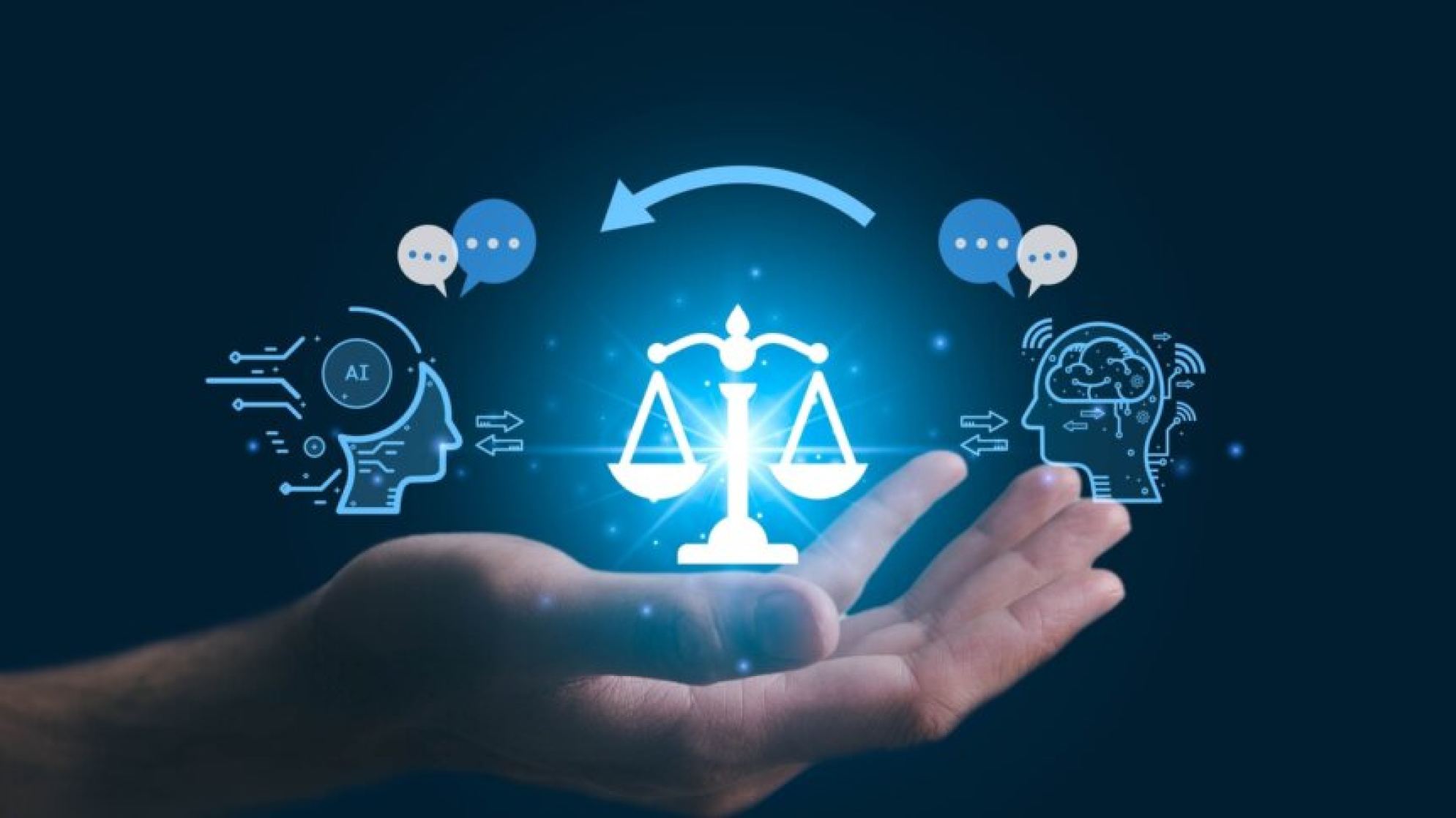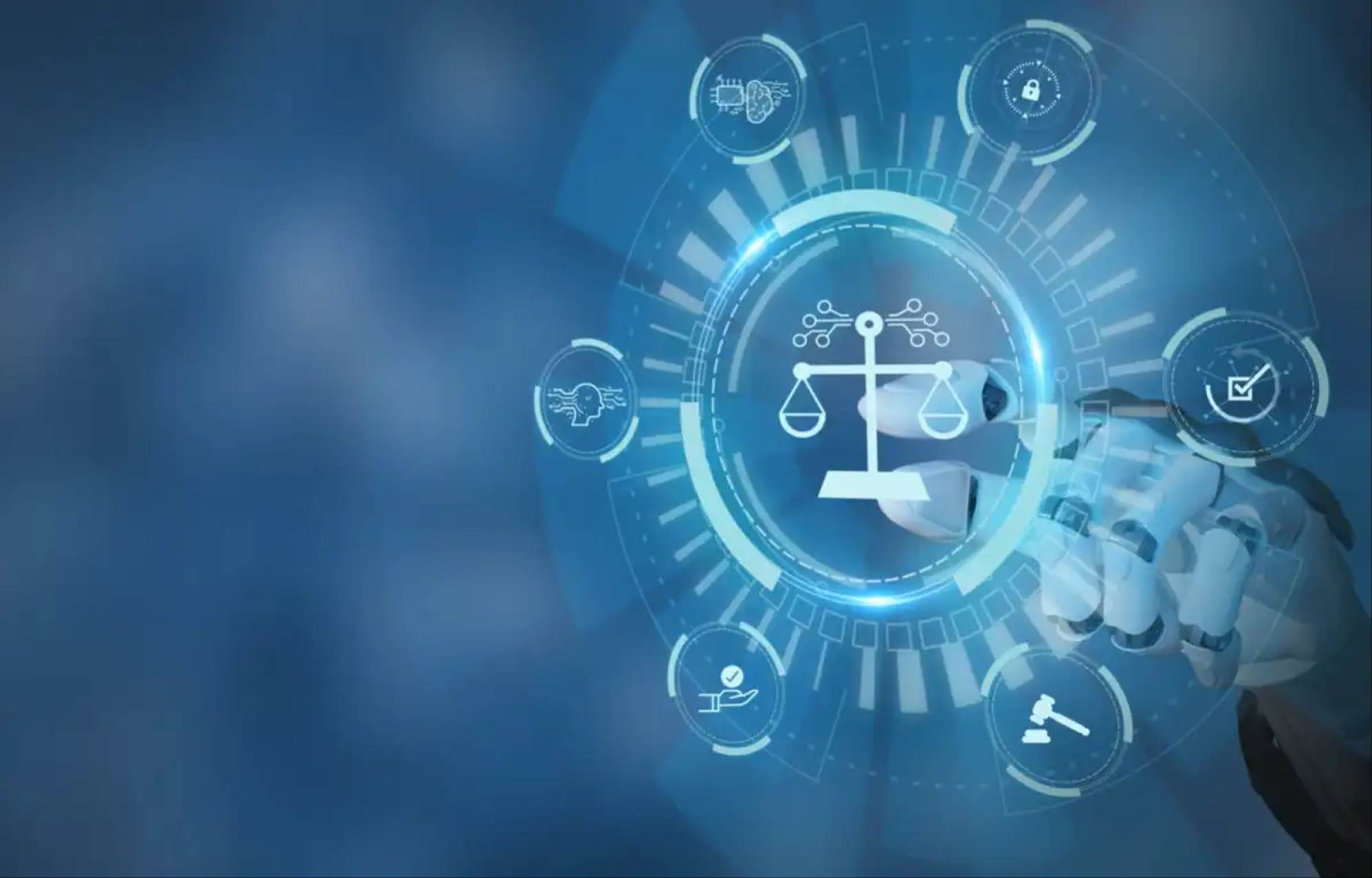We build digital products to help businesses succeed!
Introduction
AI ethics stands at the forefront of contemporary discourse. As we harness the power of artificial intelligence, the imperative for ethical AI development becomes increasingly critical. A recent survey by Deloitte revealed that 32% of US executives rank ethical considerations among the top three risks associated with AI deployment. This statistic underscores the urgency with which the tech community must address the ethical dilemmas posed by AI. The journey towards responsible AI is paved with complex challenges and profound questions.
How do we balance the relentless pursuit of advancement with the moral obligations we owe to society? According to Gartner, 42% of decision-makers have implemented data reviews to test for biases, highlighting the proactive steps being taken to mitigate AI’s ethical risks. This blog aims to navigate the ethical landscape of AI solutions, offering a beacon of guidance through the murky waters of moral uncertainty. By integrating industry perspectives and establishing guidelines for responsible AI use, we strive to foster an environment where technology aligns with the greater good of humanity.
Defining AI Ethics in the Modern World
In the modern world, AI ethics is a multidimensional concept that encompasses a range of practices and principles aimed at ensuring responsible AI development and use. At its core, AI ethics is about creating AI systems that not only comply with legal standards but also uphold the highest moral values, contributing positively to society.
The essence of ethical AI development lies in its ability to respect and enhance human dignity and rights. It involves careful consideration of how AI systems are designed, what data they use, how they process that data, and the implications of their decisions. Ethical AI must be transparent, explainable, and free from biases that could lead to discrimination or harm. To achieve this, developers and stakeholders must engage in continuous dialogue about the values that should guide AI development.

The Pillars of Ethical AI Development
The pillars of ethical AI development are fundamental principles that serve as the bedrock for fostering responsible AI. These pillars guide the creation of AI systems that are not only efficient and effective but also just and equitable. Here are the key pillars that uphold the integrity of AI ethics:
- Transparency:
One of the most critical aspects of ethical AI is transparency. Users should be able to understand how AI systems make decisions, and developers should openly communicate the capabilities and limitations of their AI solutions. This openness builds trust and facilitates informed consent.
- Accountability:
Ethical AI systems must have clearly defined accountability mechanisms. If an AI system causes harm, it should be possible to ascertain who is responsible for the damage—whether it’s the developers, users, or other stakeholders.
- Fairness:
AI systems should be designed to be fair and not discriminate against any individual or group. This involves rigorous testing for biases and the implementation of corrective measures to prevent discriminatory outcomes.
- Privacy:
Protecting the privacy of individuals is paramount in AI development. Ethical AI systems must ensure that personal data is handled securely and in compliance with data protection laws and standards.
- Beneficence:
AI should be developed with the intent to do good and generate positive outcomes for society. This means prioritizing the well-being of individuals and the community in the development and deployment of AI technologies.
- Non-maleficence:
A commitment to avoiding harm is essential. Ethical AI development involves proactive steps to prevent potential negative impacts on individuals and society.
- Autonomy:
Ethical AI should enhance human autonomy, not undermine it. AI systems should support and empower users, allowing them to make independent choices and control their interactions with technology.
We can ensure that AI ethics are deeply ingrained in the life cycle of AI systems, from conception to deployment, by following these principles. The goal is to create responsible AI that not only advances technological frontiers but also aligns with our collective moral compass, leading to ethical AI development that benefits all of humanity.
Guidelines for Responsible AI Use
As we delve into the Guidelines for Responsible AI Use, it’s essential to recognize that AI ethics form the backbone of ethical AI development. These guidelines are not just recommendations; they are crucial for ensuring that AI systems are used in a way that aligns with societal values and respects individual rights. Here’s how we can integrate these principles into the fabric of AI usage:
- Prioritize Human-Centric Values: AI should augment human abilities and enhance quality of life without infringing on privacy or autonomy. Responsible AI means putting people first, ensuring that AI serves to support and improve human decision-making, not replace it.
- Ensure Inclusivity and Diversity: AI systems must be developed with diverse datasets and perspectives to avoid biases. This includes actively seeking input from underrepresented groups and ensuring that AI solutions are accessible to all, regardless of background or ability.
- Promote Transparency and Explainability: Users should have a clear understanding of how AI systems operate and make decisions. This transparency is vital for trust and accountability, particularly in sectors like healthcare, finance, and law enforcement where decisions have significant impacts.
- Implement Robust Security Measures: Protecting data and systems against breaches is a non-negotiable aspect of ethical AI development. This includes regular audits, strong encryption practices, and swift responses to any security incidents.
- Adopt Continuous Monitoring and Evaluation: AI systems should be regularly assessed for their impact on individuals and society. This ongoing evaluation helps to identify and mitigate any unintended consequences, ensuring that AI remains a force for good.
- Foster Collaborative Governance: Developing a framework for AI governance that involves multiple stakeholders, including policymakers, technologists, and civil society, can help balance innovation with ethical considerations.
By adhering to these guidelines, we can navigate the complex landscape of AI solutions with a compass pointed firmly towards responsible AI.

How Leading Tech Companies Approach AI Ethics: 5 Examples
Leading tech companies are increasingly recognizing the importance of AI ethics as they develop and deploy AI solutions. The approach to ethical AI development involves a multifaceted strategy that integrates responsible AI practices into every stage of the AI lifecycle. Employees are often provided with training on ethical AI development, and some companies have even created specialized roles dedicated to overseeing the ethical deployment of AI technologies. Here’s how five real-world companies approach AI ethics:
1. Google
Google emphasizes the importance of social benefit, avoiding unfair bias, safety, accountability, privacy, and upholding high standards of scientific excellence in its AI principles. They aim to be socially beneficial, avoid creating or reinforcing unfair bias, build and test for safety, be accountable to people, incorporate privacy design principles, and uphold high standards of scientific excellence.
2. Microsoft
Microsoft has identified six principles to guide AI development and use: fairness, reliability and safety, privacy and security, inclusiveness, transparency, and accountability. They operationalize responsible AI through governance, policy, and research, ensuring AI systems treat all people fairly and perform reliably and safely.
3. IBM
IBM’s approach to AI ethics is multidisciplinary and multidimensional, focusing on trust and transparency. They believe AI should make jobs better and benefits should touch many, not just a few. IBM’s AI ethics framework includes principles such as fairness, explainability, robustness, transparency, and privacy.
4. Amazon
Amazon commits to promoting the safe, secure, and transparent development of AI technology. They focus on internal and external testing of models, information sharing regarding trust and safety risks, and investing in cybersecurity and insider threat safeguards. Amazon also emphasizes the importance of public reporting on model capabilities and limitations, including discussions on societal risks.
5. Meta
Meta grounds its work in AI around five pillars: privacy and security, fairness and inclusion, robustness and safety, transparency and control, and accountability and governance. They are committed to ensuring that AI benefits people and society, with regular collaboration with experts and stakeholders to build and test responsible AI approaches.
Strategies for Implementing Ethical AI Practices
Implementing ethical AI practices is crucial for ensuring responsible AI development. Here are some strategies that can help organizations navigate the ethical landscape of AI solutions:
- Develop Ethical Guidelines:
Establish clear guidelines that reflect the organization’s commitment to AI ethics. These should cover aspects such as fairness, accountability, transparency, and privacy.
- Create an Ethics Board:
Form a diverse board with members from various backgrounds to oversee ethical AI development and ensure that AI practices align with the established guidelines.
- Conduct Impact Assessments:
Regularly perform impact assessments to understand the potential ethical implications of AI systems and make necessary adjustments.
- Foster an Ethical Culture:
Encourage an organizational culture that prioritizes ethical considerations in every aspect of AI development and deployment.
- Invest in Training:
Provide comprehensive training for employees on responsible AI practices to raise awareness and understanding of ethical issues in AI.
- Engage Stakeholders:
Involve stakeholders, including users and affected communities, in discussions about AI development to ensure diverse perspectives are considered.
- Monitor and Audit:
Continuously monitor and audit AI systems to detect and address any ethical issues that may arise during their operation.
- Promote Transparency:
Be transparent about how AI systems work, the data they use, and the decision-making processes they employ.
- Implement Feedback Mechanisms:
Create channels for feedback from users and stakeholders to inform ongoing improvements in AI practices.

Overcoming Challenges in Responsible AI Deployment
Deploying AI responsibly is fraught with challenges, but overcoming them is essential for ethical AI development. Here are some strategies to address these challenges:
- Understanding and Mitigating Bias: One of the most significant hurdles in responsible AI is the presence of bias in AI systems. To overcome this, it’s crucial to employ diverse datasets and involve multidisciplinary teams in the development process to identify and mitigate potential biases.
- Ensuring Data Privacy: Protecting user data is paramount. Implementing robust data encryption and anonymization techniques can help maintain privacy while still allowing AI systems to learn from vast amounts of data.
- Balancing Innovation with Regulation: As AI technology advances, so must the regulatory frameworks that govern it. Collaborating with legal experts and policymakers can help ensure that AI solutions comply with current laws and ethical standards.
- Developing Ethical AI Literacy: Education is a powerful tool in overcoming challenges in AI deployment. Offering training programs and resources can help stakeholders understand the importance of AI ethics and how to implement them in practice.
- Creating an Ethical AI Ecosystem: Encouraging collaboration between industry, academia, and government can foster an ecosystem that supports ethical AI development. Sharing best practices and resources can help organizations navigate the ethical complexities of AI.
Conclusion
As we end our exploration of “Ethical AI development” it’s clear that AI ethics and responsible AI are not just buzzwords; they are imperatives for the future of technology. The journey towards ethical AI is a continuous one, marked by the collective efforts of developers, companies, policymakers, and users. The commitment to ethical AI must be unwavering, as the decisions we make today will shape the impact of AI on our society tomorrow.
By prioritizing responsible AI practices, we can ensure that AI serves as a force for good, enhancing our lives while respecting our values and rights. In the pursuit of ethical AI development, let us remember that technology is a tool created by humans, for humans. It is our responsibility to wield this tool with care, foresight, and a deep sense of duty to the ethical principles that define our humanity. The path ahead is complex, but with collaboration, diligence, and a steadfast dedication to ethics, we can navigate it successfully.
Offices
India
86P, 4th Floor, Sector 44, Gurugram, Haryana 122003Singapore
#21-02, Tower 2A, The Bayshore condo, Singapore 469974Canada
8 Hillcrest Avenue Toronto ON M2N 6Y6, CanadaUS
31 River CT, Jersey City, New JerseySubscribe to our newsletter
Our Services
Top Reads
India
86P, 4th Floor, Sector 44, Gurugram, Haryana 122003
Singapore
#21-02, Tower 2A, The Bayshore condo, Singapore 469974
Canada
8 Hillcrest Avenue Toronto ON M2N 6Y6, Canada
US
31 River CT, Jersey City, New Jersey
Contact us
info@primathon.in
+91-9205966678
Reviews


